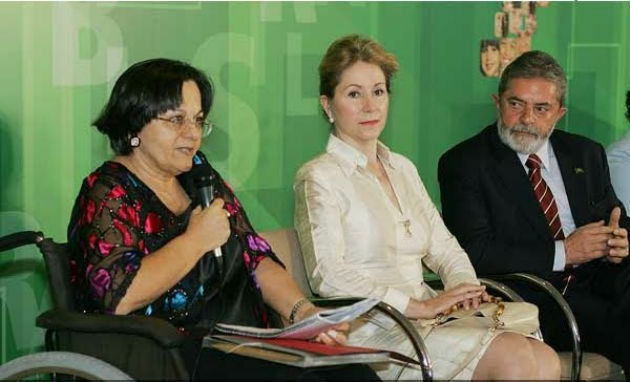THE Law Maria da stone, sanctioned on August 7, 2006, as Law No. 11,340 aims to protect women from domestic and family violence.
The law got its name due to the struggle of pharmaceutical Maria da Penha to see her aggressor convicted.
Features
The law applies to all people who identify with the female sex, heterosexuals and homosexuals. This means that transsexual women are also included.
Likewise, the victim needs to be in a situation of vulnerability in relation to the aggressor. This does not necessarily have to be the husband or partner: it can be a relative or a person you are close to.

The Maria da Penha law does not only cover cases of physical aggression. Situations of psychological violence such as distancing from friends and family, offenses, destruction of objects and documents, defamation and slander are also foreseen.
News brought with the Maria da Penha Law:
- Imprisonment of the suspect of aggression;
- domestic violence becomes an aggravating factor to increase the sentence;
- it is no longer possible to substitute the penalty for the donation of a basic food basket or fines;
- removal order from the aggressor to the victim and their relatives;
- economic assistance in case the victim is dependent on the aggressor.
History
Maria da Penha is a Brazilian pharmacist, born in Ceará, who suffered constant aggression from her husband.
In 1983, her husband tried to kill her with a shotgun blast. Although she escaped death, it left her paralyzed. When she finally returned to the house, she suffered another assassination attempt as her husband tried to electrocute her.
When she got up the courage to denounce her aggressor, Maria da Penha was faced with a situation that many women faced in this case: disbelief on the part of the Brazilian justice system.
For its part, the aggressor's defense always alleged irregularities in the process and the suspect was awaiting trial in freedom.
In 1994, Maria da Penha launched the book “I survived...I can tell” where she narrates the violence suffered by her and her three daughters.
Likewise, she decides to activate the Center for Justice and International Law (CEJIL) and the Latin American and Caribbean Committee for the Defense of Women's Rights (CLADEM).
These bodies forward their case to the Inter-American Commission on Human Rights of the Organization of the American States (OAS), in 1998.
Maria da Penha's case was only resolved in 2002 when the Brazilian State was convicted of omission and negligence by the Inter-American Court of Human Rights.
Thus, Brazil had to commit to reforming its laws and policies in relation to domestic violence.
Years after it came into force, the Maria da Penha law can be considered a success. Only 2% of Brazilians have never heard of this law and there was an 86% increase in reports of family and domestic violence after its creation.
Assistance to Victims of Violence

To help victims of violence, the government has provided the number 180 in which the person who feels the victim of violence can report their aggressor.
Likewise, it established the Casa da Mulher Brasileira with the specific objective of welcoming women who have nowhere to go.
Figures on Violence against Women in Brazil
Despite the success of the Maria da Penha Law, statistics on violence against women in Brazil remain high. See these data:
- Every day around 13 women are murdered in Brazil, according to the 2015 Map of Violence, carried out by the Latin American Faculty of Social Sciences (Flacso).
- In 2013, 4,762 murders of women were registered. Of these, 50.3% were committed by family members, and in this universe, 33.2% of these cases, the crime was committed by the partner or ex., according to the same survey.
- 3 out of 5 young women have suffered violence in relationships, according to a survey carried out by the Avon Institute in partnership with Data Popular (Nov/2014).
read more:
- violence against women
- Feminism
- Feminism in Brazil
- Urban violence
- Violence in Brazil
- International Women's Day
- Extraordinary Women Who Made History
- Women who made the history of Brazil
- Inspiring black women
